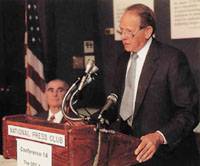- Moderator
- #21
The Rightwing's peculiar demonization of Rachel Carson....
Rachel Carson has long been considered to be one of the pioneers and a heroine of the environmental movement. Her book Silent Spring (1962) was an environmental classic, and helped galvanize the early environmental movement in the U.S. It popularized the research that showed that DDT sprayed indiscriminately to kill mosquitoes was also killing a wide variety of other harmless wildlife. In particular, DDT was destroying bird populations because of the increasing concentrations of the poison as it went up the food chain, so that apex predators like hawks, falcons and eagles were dying off at alarming rates. Historians regard the banning of DDT as an early environmental success story. At the time, the ban had widespread support from both Republicans and Democrats in Congress, and DDT was finally made illegal under Nixon’s Republican administration. Carson herself died in 1964, too soon to see how her efforts led to the banning of DDT and the birth of the EPA and Environmental Defense Fund and many other environmental movement organizations.
Most of us consider Carson’s legacy settled. But one can never underestimate the anti-environmentalists and their ability to write revisionist history, and to create villains out of heroines. In a modern world with openly partisan networks like Fox, and industry-funded conservative think tanks generating their own propaganda, and with the crazy garbage that flies across the internet, even environmental saints like Rachel Carson cannot escape the abuse.
As Oreskes and Conway (2010, Chapter 7) document in detail, since 2007 the right-wing and libertarian organizations are calling Rachel Carson a mass-murderer. What? Did they even read about her life? This shy, humble scientist a mass murderer? Their “reasoning”: because her work led to the banning of DDT, thousands of Africans died of malaria, which might not have happened if DDT were available to them. I won’t rehash the entire ill-informed and crazy, convoluted thinking of these people, since Oreskes and Conway (2010) have done it already. The reality of the whole argument is that even if DDT had not been banned, its use would have stopped anyway because insects had evolved resistance to it. DDT was already being phased out at the time of the ban, and other pesticides that worked better and didn’t damage too many harmless animals were being used instead—because DDT didn’t work! If, as these people propose, DDT had been sprayed across the waterways of Africa, it would not have saved any lives whatsoever because of the evolution of resistance. In fact, many other pesticides that have since been used over the years are now useless because insect pests (especially mosquitoes) evolve resistance so quickly. Yet these people manage to distort history as badly as any Holocaust-denier—except instead of trying to exonerate the Nazis of genocide, they turn Rachel Carson into a mass murderer.
Most of us consider Carson’s legacy settled. But one can never underestimate the anti-environmentalists and their ability to write revisionist history, and to create villains out of heroines. In a modern world with openly partisan networks like Fox, and industry-funded conservative think tanks generating their own propaganda, and with the crazy garbage that flies across the internet, even environmental saints like Rachel Carson cannot escape the abuse.
As Oreskes and Conway (2010, Chapter 7) document in detail, since 2007 the right-wing and libertarian organizations are calling Rachel Carson a mass-murderer. What? Did they even read about her life? This shy, humble scientist a mass murderer? Their “reasoning”: because her work led to the banning of DDT, thousands of Africans died of malaria, which might not have happened if DDT were available to them. I won’t rehash the entire ill-informed and crazy, convoluted thinking of these people, since Oreskes and Conway (2010) have done it already. The reality of the whole argument is that even if DDT had not been banned, its use would have stopped anyway because insects had evolved resistance to it. DDT was already being phased out at the time of the ban, and other pesticides that worked better and didn’t damage too many harmless animals were being used instead—because DDT didn’t work! If, as these people propose, DDT had been sprayed across the waterways of Africa, it would not have saved any lives whatsoever because of the evolution of resistance. In fact, many other pesticides that have since been used over the years are now useless because insect pests (especially mosquitoes) evolve resistance so quickly. Yet these people manage to distort history as badly as any Holocaust-denier—except instead of trying to exonerate the Nazis of genocide, they turn Rachel Carson into a mass murderer.





